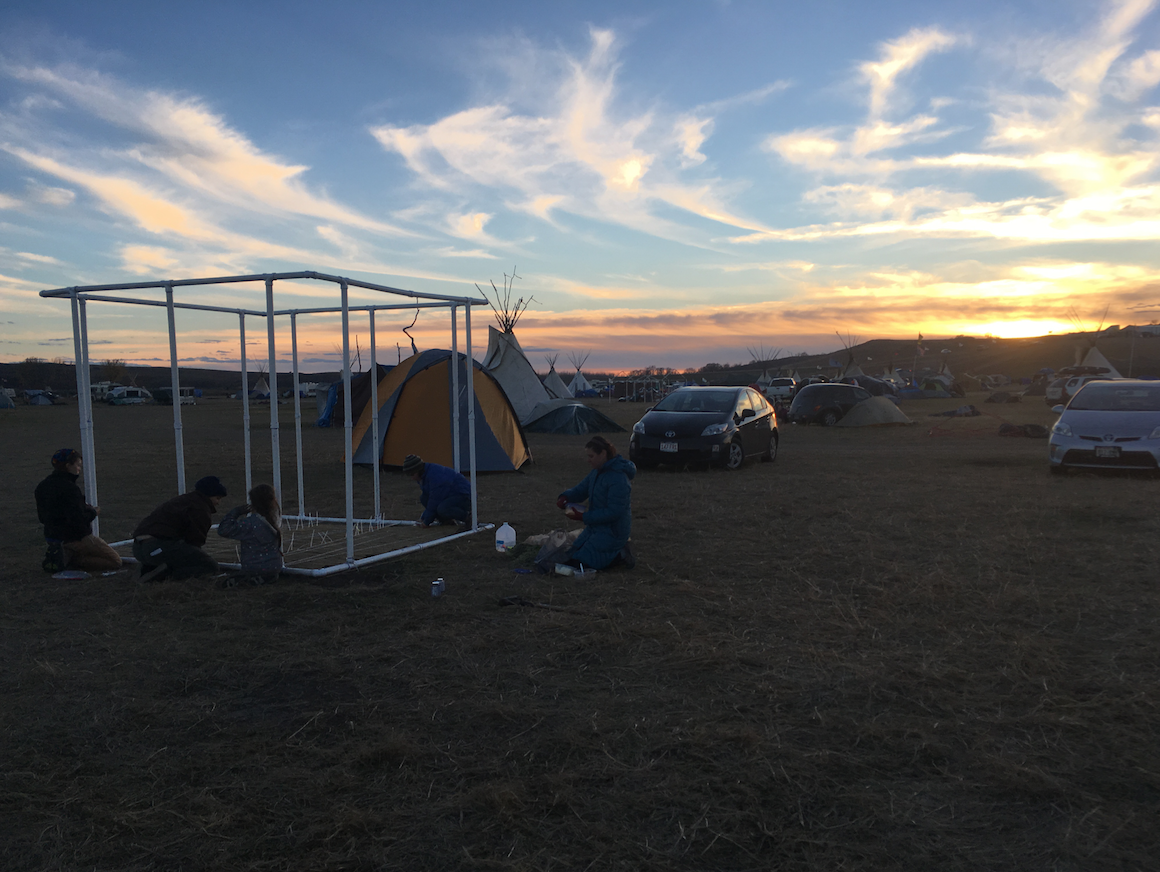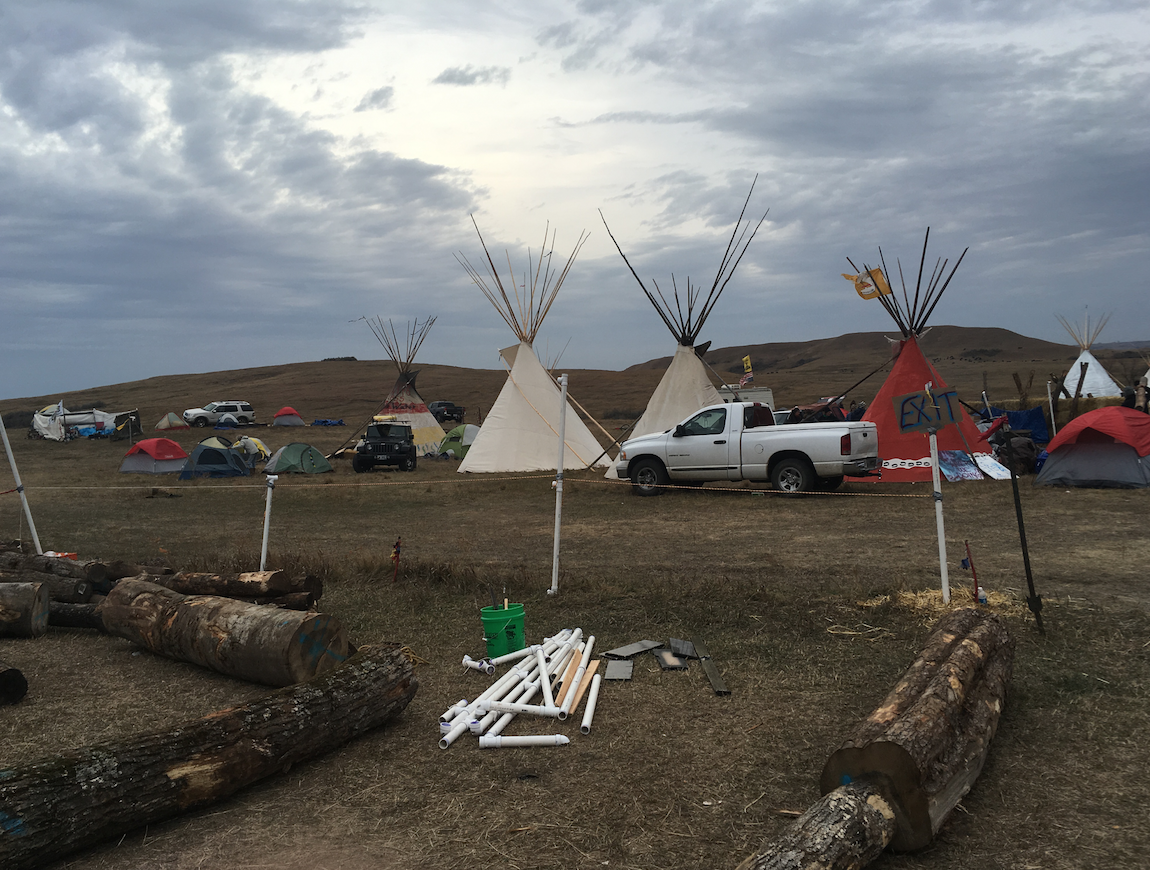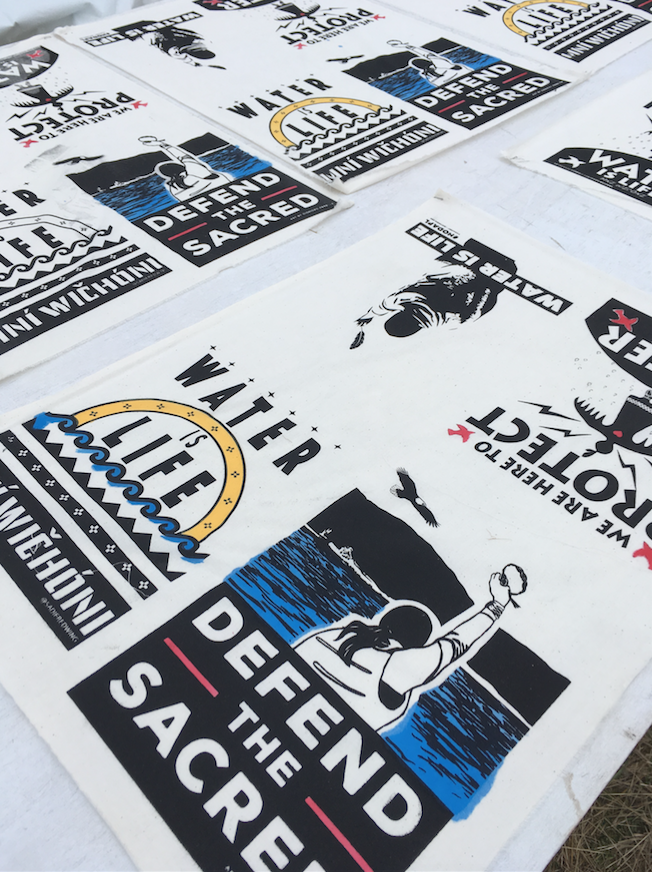
Called to Standing Rock
Every dawn at the Oceti Sakowin (Och-et-ee Shak-oh-win) Camp in Standing Rock, North Dakota, we were awakened by a elder crying out over a loudspeaker, from the Sacred Fire, “Water Protectors wake up! We are here for a reason! We are here to cut the Black Snake’s head off! Do what you came here to do!… Take courage in your heart!” We were called to morning prayer, to the front lines and to prepare food for the community. These were the clearest shofar calls we have ever heard. We heard Native elders calling us from their traditions and experiences, “Wake up! There are injustices here and we are asking for the Creator to guide us in preserving the water and earth for ourselves and for future generations and you are here to support us.”
As five friends involved in social justice organizing and Jewish learning and practice, we decided to spend Sukkot at Standing Rock in solidarity with the Standing Rock tribe and others from hundreds of native tribes.We gathered as Water Protectors to fight the construction of the Dakota Access Pipeline. The DAPL, a desperate fracking project of Energy Transfer Partners, slated to go under the Missouri River and carry oil from North Dakota to Illinois, is often called the Black Snake by Lakota in reference to a well-known prophecy that a black snake will emerge, bringing destruction and despair to the earth. Following colonialist patterns, the pipeline was rerouted to Native land, away from the 90% white city of Bismarck in order to avoid contaminating the city’s water.

The Water Protectors of Standing Rock are rightfully concerned that the oil pipeline will leak, as pipelines often do, since regulation requires only minimal detection and reporting. If the DAPL were to leak, it would poison the Ogallala aquifer, which provides water for the local tribal territory, as well as for most of the Midwest. They are also protecting what are their sovereign rights and sacred sites, including burial grounds, many of which have already been desecrated by pipeline construction.Other projects have already reshaped this landscape in an abuse of Federal power, making this struggle a contemporary episode in the centuries-long saga of the colonization and exploitation of Native lands, and of violence against Native people.
During the week of Sukkot, which we spent at Oceti Sakowin, the Standing Rock Tribe with the support of the Water Protectors escalated pressure against the DAPL by exercising their right to eminent domain. They established a new residence camp directly on the path of the pipeline. This new encampment led to increased police presence and over 120 additional arrests. The police acted as an occupying army, with the force of military weapons to exert dominance over the land and remove people, as they have done for generations, pushing peaceful ceremonies out of the way of construction. The police expelled the encampment within four days.

Spending Sukkot on the front lines was a way to live out the values we hold all year and to intensify our commitment to justice in the way the month of Tishrei calls us to do. Our group of five non-Native Jews brought supplies for a sukkah and sought guidance on protocols for requesting permission from the Lakota elders to build it. This Lakota-led movement welcomes various forms of participation and calls for non-Native allies to bring their bodies to the front lines and to pray in their own ways. In fact, prayer and ceremony are the Water Protectors’ main form of resistance at Standing Rock, a form of resistance for which the police are not prepared. Despite being welcomed as guests on the land and in the camp, we still felt the weight of asking to build a sukkah, knowing that Native prayer and ritual were officially illegal until 1978 and continue to be subjugated violently at Standing Rock and throughout the country. We attended one of the daily council meetings, held in a traditional Lakota meeting style. We listened to many of the concerns and developments of the camp, introduced ourselves and made our request with a tobacco offering, wrapped in a red cloth in accordance with tradition. We shared that, among other meanings, Sukkot is a holy week that emphasizes the precariousness of human life on earth, hospitality, and the presence of ancestors in our midst; and that, at the end of the week, Jews call for rain, knowing that our crops and lives are dependent on water. It wasn’t a stretch to find common ground between the messages of Sukkot and the Native values, including the camp’s core statement: mni winconi (mini we-choh-nee), Lakota for “water is life.”

Even as we noticed such instances of common ground, we also tried to think past our similarities and consider more deeply the specificities of the Lakota culture, history and world-view. For example, both Jewish and Lakota traditions use the number seven to understand creation and time, but the Lakotas’ principle to make decisions that will benefit people living seven generations from today, frames the struggle against the DAPL in a specific way. Thinking past our apparent similarities helped us see that while our shared human need for water and protecting the earth can bring us together on the front lines, this struggle is not only about oil and water. It is ultimately about asserting Native self-determination, without which we cannot build a world free of racism and exploitation.
Because resisting the DAPL is a piece of a larger decolonization process, the Water Protectors have given clear instructions for non-Native allies on how to participate. Water Protectors can be supported financially for supplies and legal funds. If you can answer the call to bring your body to the front lines, which is a high priority, be sure to defer to local Native leadership at the camp. We need to learn what land we, our schools and our synagogues are occupying and to participate in solidarity with local indigenous struggles. Government reparations for the thefts and injustices that led to our skewed economy, including returning land and honoring treaties, are crucial to the process.



